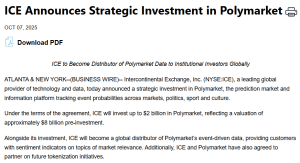Coinbase Buys UpOnly NFT For $25M, Can Make Cobie ‘Perform Like A Monkey’ In Podcast Comeback
Coinbase has bought the UpOnly NFT for $25 million, giving it the power to make crypto trader Cobie “perform like a monkey” in a surprise revival of the eponymous podcast.
Coinbase CEO Brian Armstrong confirmed the purchase in a post on X, saying it will mark the podcast’s long-awaited return. According to the NFT’s fine print, the token’s holder “can compel Cobie and Ledger Status into performing, like monkeys, 8 episodes of UpOnlyTV.”
Cobie reacted with disbelief, telling Armstrong in a post on X that whoever approved the decision should be ”fired.”
”I’m too old to have a crypto podcast,” he said in another post that’s received more than 258k view. ”It has been 3 years since up only ended. I was in my 20s when it started, now I have grey hair. We will rename it Unc Only and I will spend $25m on cosmetic surgery. See ya soon.”
The move fulfills a challenge Cobie set earlier this year, when he minted the NFT and declared the show would only return if the token’s owner burned it. Coinbase’s decision to buy it signals the exchange’s interest in reviving one of crypto’s most recognizable media brands.
Transaction details for the purchase (Source: Etherscan)
Cobie’s Challenge
The NFT originated from the podcast UpOnly, which was hosted by the trader along with Ledger before it’s demise after the crypto winter.
In May, Cobie created a challenge that if someone burns the NFT, the program would return for another season.
“OK I am no longer the decision maker on if UpOnly returns,” the trader wrote in an X post at the time. “The power is now stored within this NFT that I just minted. When the NFT is burned, the podcast will restart. Until then, please leave me alone.”
Coinbase Urges Treasury To Scrap Old AML Rules
Even as it embraces crypto culture, Coinbase is also lobbying the US Treasury to overhaul outdated anti-money-laundering requirements to reflect advances in blockchain and AI technology.
Coinbase’s chief legal officer (CLO) Paul Grewal argued in a letter dated Oct. 17 that money laundering schemes have become increasingly sophisticated through the use of advanced technologies.
He added that the “sheer volume and speed of financial transactions processed daily” has compounded current challenges.
Grewal then went on to pitch an innovation-driven solution that combines new technologies, including blockchain, to counter the emerging risks.
That was in response to the Treasury’s Department’s request for comment on how to deter illicit activity in crypto.
“Good Guys Need Innovation To Keep Pace,” Says Coinbase’s CLO
Grewal posted the key points of Coinbase’s letter on X yesterday.
“When bad guys innovate in financial crime, good guys need innovation to keep pace,” he said.
Grewal listed four steps that the Treasury needs to take to combat illicit activity in crypto.
The first is to “establish a regulatory safe-harbor under the Bank Secrecy Act for firms who responsibly deploy AI to improve AML compliance programs.”
He argued that this safe-harbor should then focus on governance and outcomes instead of “forcing a one-sized-fits-all-model.”
Grewal also said that the Treasury Department should issue guidance that “clearly recognizes and defines regulatory expectations for API-driven AML compliance technologies.” This proposed guidance should outline “acceptable use cases, data privacy requirements, and standards for interoperability,” Grewal said.
The next step, according to the Coinbase CLO, is to amend the Bank Secrecy Act’s customer identification requirements “to include decentralized identification and zero-knowledge proofs as part of an approved identification verification process.“
Lastly, Grewal said that the Treasury should also publish guidance that “recognizes and incentivizes the use of Know-You-Transaction screening” along with blockchain analytics clustering. This, he argued, will be a “more effective” way for companies to maintain AML compliance.
This is not the first time that Coinbase has pushed for better crypto regulation and monitoring in the US. The exchange has also spent $2.13 million lobbying in the US to date.
You May Also Like

Bitcoin Breaks Below $100K But Stablecoin Inflows Hint at Quiet Re-Risking

Polymarket To Provide UFC, Zuffa Boxing With Real-Time Fan Predictions
